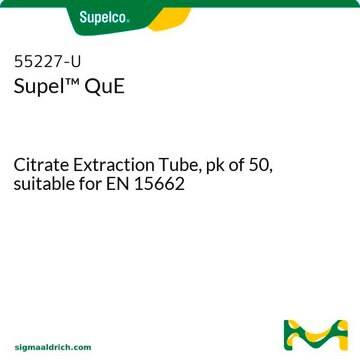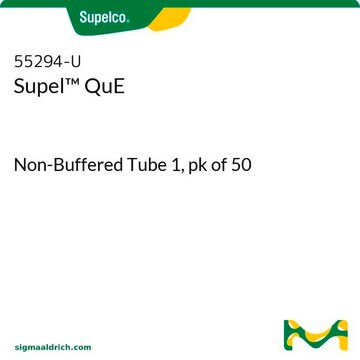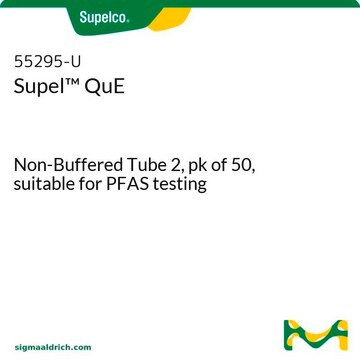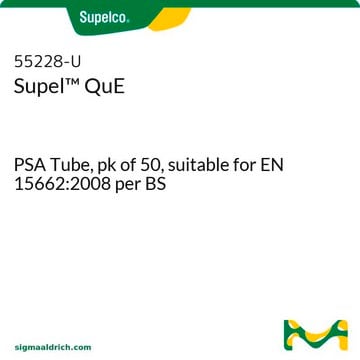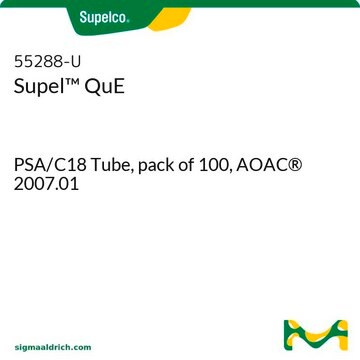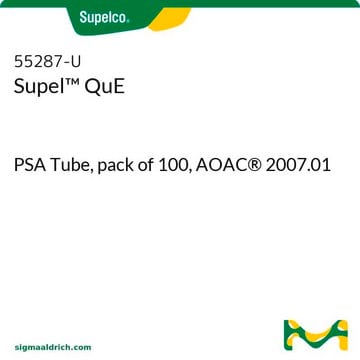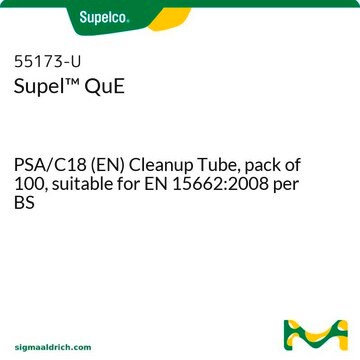55234-U
Supel™ QuE QuEChERS tube
Acetate Tube, pk of 50, AOAC® 2007.01
Synonym(s):
QuEChERS
About This Item
Recommended Products
product name
Supel™ QuE, Acetate Tube, pk of 50, AOAC® 2007.01
material
polypropylene tube
Agency
AOAC® 2007.01
product line
Supel™
composition
magnesium sulfate, 6 g
sodium acetate, 1.5 g (Cat. No. 58750)
packaging
pk of 50
technique(s)
QuEChERS: suitable
centrifuge tube volume
15 mL
application(s)
food and beverages
separation technique
ion exchange
Looking for similar products? Visit Product Comparison Guide
General description
Using the QuEChERS method, food/agricultural samples are first extracted with an aqueous miscible solvent (e.g., acetonitrile) in the presence of high amounts of salts (e.g., sodium chloride and magnesium sulfate) and/or buffering agents (e.g. citrate) to induce liquid phase separation and stabilize acid and base labile pesticides, respectively. Upon shaking and centrifugation, an aliquot of the organic phase is subjected to further cleanup using SPE. Unlike traditional methods using SPE tubes, in dispersive SPE, cleanup is facilitated by mixing bulk amounts of SPE (e.g., Supelclean PSA, ENVI-Carb, and/or Discovery DSC-18) with the extract. After sample cleanup, the mixture is centrifuged and the resulting supernatant can either be analyzed directly or can be subjected to minor further treatment before analysis.
Supelco carries a line of vials and centrifuge tubes containing pre-determined amounts of salts and SPE sorbents to support the most common method configurations used today.
Suitability
Legal Information
Storage Class Code
12 - Non Combustible Liquids
WGK
WGK 1
Flash Point(F)
Not applicable
Flash Point(C)
Not applicable
Choose from one of the most recent versions:
Already Own This Product?
Find documentation for the products that you have recently purchased in the Document Library.
Customers Also Viewed
Articles
SPE retention mechanism in this case is based on the electrostatic attraction of charged functional groups of the analyte(s) to oppositely charged functional groups on the sorbent.
Protocols
Analysis of banned neonicotinoid insecticides from dandelion blossoms using QuEChERS and LC-MS.
Normal-phase SPE separates analytes based on polar interaction with sorbents in diverse sample matrices.
Related Content
Gas chromatography separates volatile compounds in the gas phase, applied in various industries for quality control.
QuEChERS method simplifies sample cleanup for pesticides analysis in food and agricultural samples.
Chromatograms
application for SPE, suitable for GCsuitable for GC, application for SPEOur team of scientists has experience in all areas of research including Life Science, Material Science, Chemical Synthesis, Chromatography, Analytical and many others.
Contact Technical Service